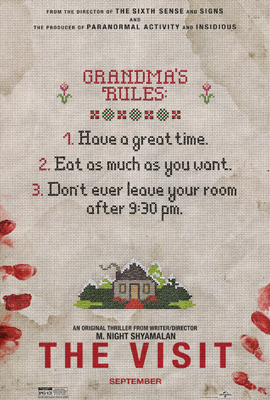 If you’re waiting for M. Night Shyamalan to deliver the power punch felt in his first feature film “The Sixth Sense,” you’ll have to wait a little longer- his new horror film “The Visit” feels almost like a backhanded slap in comparison. While the film’s intentions are good, it suffers from its own misdirection and its sting and impact quickly fade.
If you’re waiting for M. Night Shyamalan to deliver the power punch felt in his first feature film “The Sixth Sense,” you’ll have to wait a little longer- his new horror film “The Visit” feels almost like a backhanded slap in comparison. While the film’s intentions are good, it suffers from its own misdirection and its sting and impact quickly fade.
I like Shyamalan or any director with style and smarts behind what they’re doing. However, with “The Visit,” his good intentions betray him. Employing the hand-held camera/found footage technique used in horror movies like “The Blair Witch Project,” Shyamalan legitimately uses this technique to deliver the surprising twist/payoff so many of his fans have come to look forward to and expect. However, in using this technique solely for the sake of the twist, he undercuts the plausibility of the story to such a degree that even the novelty of its unique perspective can’t reap the visual scares or surprises you’d think would be in store.
“The Visit’s” story has a good hook albeit slightly unbelievable- two young kids named Becca and Tyler (Olivia DeJonge and Ed Oxenbould) agree to visit their estranged grandparents to allow their Mom (Kathryn Hahn) to go on a vacation with her new boyfriend. While the kids’ motives for the visit are purely goodwill in allowing Mom time to find love again while re-establishing a relationship with their long-lost grandparents, the prospect of their spending a week with ‘strangers’ didn’t exactly gel with me. The reason for the grandparents’ estrangement is the result of an argument: they forbid Mom to marry Dad as he had a “wandering eye.” While her parents were ultimately vindicated as Dad left his family for another woman, Mom seems a little too nonplussed at the prospect of having her children spend time with the parents she distanced herself from years before. Is the kids’ visiting a way for Mom to rekindle a relationship with her parents? If so, why doesn’t she just postpone her vacation and visit with the kids herself?
Upon meeting their grandparents at the train station, Becca and Tyler are whisked away to Nana and Pop Pop’s rural Pennsylvania farm (the fact that the kids call them Nana and Pop Pop seemed disingenuous- the kids hardly know them well enough to use terms of endearment). Becca decides to film everything with a video camera and gives Tyler another camera; they’ll make a documentary for Mom. While the goal of the video is to interview their grandparents and give Mom that long-awaited “elixir” of a forgiving statement that will reunite their estranged family, the footage shot by Becca and Tyler just points to ‘strange.’ Apart from the strange behavior Nana and Pop Pop begin to exhibit in the course of the kids’ visit, more questions begin to surface surrounding strange situations: What’s Pop Pop hiding in the shed? Why can’t the kids leave their room after 9:30 pm? What’s in the water well Nana keeps peering into? Why are Becca and Tyler forbidden to enter the basement- is the mold as bad as Pop Pop says?
While Shyamalan does a good job making Nana and Pop Pop’s strange behavior fall into plausible lines (inferring their suffering from elderly ailments like sundowning, dementia and incontinence), one wonders why the more bizarre their behavior becomes doesn’t prompt one of the kids to call for professional outside help. Sure, Becca and Tyler can’t use cell phones as they’re unable to get service, but they can talk to Mom via Skype on a laptop computer. You’ll also wonder why, as the kids’ situation gets stickier, one of them just doesn’t leave the farm or how they can keep filming the video footage and use the cameras to capture the ensuing action.
For me, good horror movies fall into two categories: they’ll either scare you by being smart or they’ll scare you into having fun by allowing you to be the smartest guy in the room. I don’t mind checking my brain at the box office where horror movies are concerned; just allow me to have some brainless fun in the process. The fun of “The Visit” only emerges when the twist reveals itself an hour into the film, so we’re stuck with weird non-threatening happenings in a horror movie that would end quickly if logic were attached to its characters and situations. Because the film is through the kids’ point-of-view, Becca and Tyler’s lack of action concerning Nana and Pop Pop’s strange behavior transfers to its audience- we don’t care until Becca and Tyler begin to care.
I’ll suspend disbelief and logic in lieu of scary fun, but “The Visit” is more strange than scary and more amusing than fun. For a guy as smart as Shyamalan, plausibility is paramount in your expectations. “The Visit” isn’t his long-awaited triumph, it’s merely a trifle.
